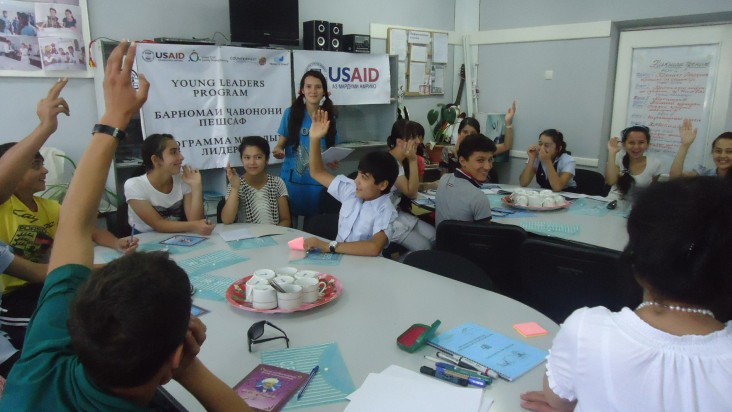
In response to a rise in cases of anthrax in northern Tajikistan, Panjakent youth from the USAID-supported Young Leaders Program assisted their communities by educating citizens about the anthrax threat and what steps to take to protect themselves and their families. There were two cases of the disease in Panjakent in November 2013.
One of the young people, 16-year-old Manizha Bobosafarova, learned about two cases of anthrax registered in her own town and recognized that residents didn’t know how to respond. Manizha conducted urgent training for community members on measures to protect themselves. Her ability to succeed in this outreach was tied to her training from the Young Leaders Program.
During USAID-sponsored civic education trainings, students learn how to create advocacy and awareness campaigns as part of their community activism projects. Building on this experience, the program conducted a six-day summer camp for 50 youth in July 2013 from three regions in Rasht, Badakhshon and Panjakent. Youth from rural areas had the opportunity to talk about conflict and peer pressure in a safe environment. These camps are especially significant as youth in these remote regions lack opportunities to interact with each other.
"I learned from the summer camp how to be proactive," said Manizha. "We didn’t wait for something to happen. Instead, we decided to conduct a small training for our community members on how to provide measures to protect themselves."
Using knowledge gained from leadership role-playing and teamwork exercises during the camp, Manizha and her fellow students visited each other’s homes, mosques and tea rooms, and held one-on-one discussions as part of the outreach campaign. Manizha’s quick thinking and action quite likely saved lives in her community. Her success promoting anthrax awareness would not have been possible without the leadership, problem solving, communication and teamwork skills she learned at the summer camp.
The goal of the Young Leaders Program is to support civically engaged and socially conscious youth in Tajikistan and to provide them with the tools and experience to take ownership of their future and contribute to the development of their country. The program works closely with local authorities, schools, parents and community leaders in target areas and uses a combination of theoretical and practical activities.
Program participants have organized more than 1, 500 events since 2012, including school clean-up days, sports competitions and nursing home visits. The program runs from April 2011 to April 2015.







Comment
Make a general inquiry or suggest an improvement.